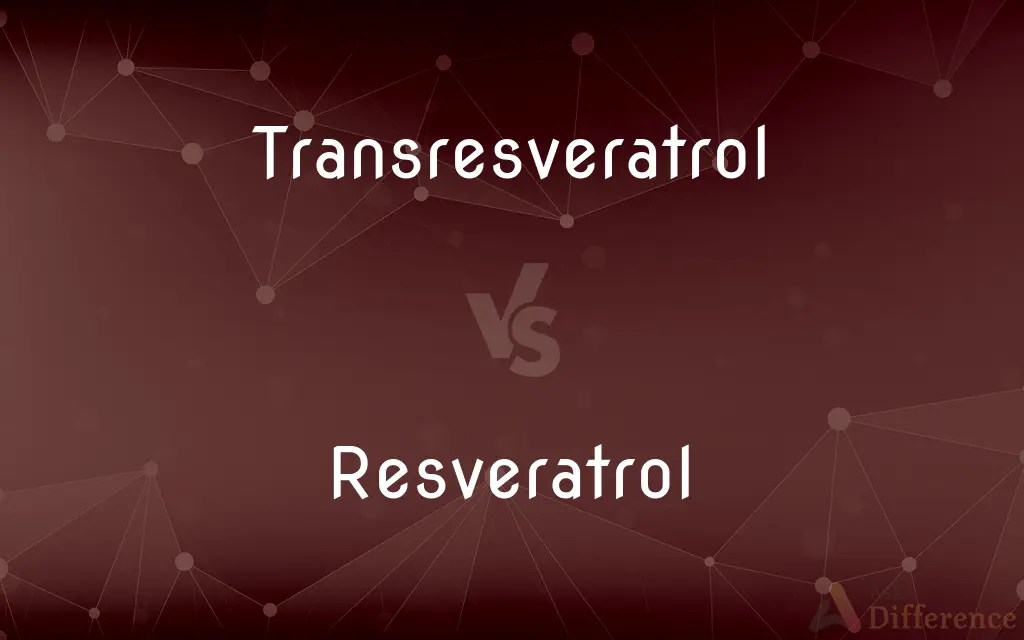Transresveratrol vs. Resveratrol — What's the Difference?
Edited by Tayyaba Rehman — By Urooj Arif — Updated on April 19, 2024
Trans-resveratrol is the biologically active form of resveratrol, mainly effective in antioxidants and anti-inflammatory actions; resveratrol includes both active and less active forms.

Difference Between Transresveratrol and Resveratrol
Table of Contents
ADVERTISEMENT
Key Differences
Trans-resveratrol is a specific isomer of resveratrol, characterized by its efficacy in health-promoting properties, particularly in cardiovascular health and longevity. Whereas resveratrol is a broader category that includes both trans-resveratrol and cis-resveratrol, the latter being less biologically active.
The bioavailability of trans-resveratrol is significantly higher than that of cis-resveratrol, which is another form of resveratrol. This means that trans-resveratrol is more readily absorbed and utilized by the body, whereas resveratrol in general may not always provide consistent levels of biological activity due to the presence of both forms.
In terms of antioxidant properties, trans-resveratrol is highly effective in neutralizing free radicals and preventing oxidative stress. On the other hand, not all forms of resveratrol exhibit this high level of antioxidant activity; the overall effect depends on the proportion of trans-resveratrol present.
When it comes to anti-inflammatory effects, trans-resveratrol has shown significant benefits in reducing inflammation at a cellular level. Resveratrol, however, encompasses varying degrees of anti-inflammatory actions, influenced by its isomeric composition.
In clinical studies, trans-resveratrol has been frequently studied for its potential to enhance cognitive function and protect against neurodegenerative diseases. In contrast, studies using resveratrol without specifying the isomer might not achieve the same clarity and reliability in results.
ADVERTISEMENT
Comparison Chart
Biological Activity
High, primarily as an antioxidant and anti-inflammatory
Varies, dependent on isomer composition
Bioavailability
High
Moderate to low, depending on isomer
Antioxidant Property
Very effective
Effectiveness varies
Anti-inflammatory Effect
Significant
Variable
Clinical Focus
Often studied for specific health benefits
Broadly studied, sometimes without isomeric specification
Compare with Definitions
Transresveratrol
A naturally occurring isomer of resveratrol known for its potent antioxidant and anti-inflammatory properties.
Trans-resveratrol is often highlighted in studies focused on anti-aging therapies.
Resveratrol
Exhibits antioxidant properties that may vary depending on the specific isomer present.
Resveratrol supplements may not always specify the isomer ratio.
Transresveratrol
The active form of resveratrol that is more easily absorbed by the human body.
Supplements often specify containing trans-resveratrol for enhanced health benefits.
Resveratrol
Known for its presence in red wine, often discussed in the context of the French paradox.
Moderate red wine consumption is beneficial due to resveratrol.
Transresveratrol
Associated with the potential reduction of heart disease risk.
Trans-resveratrol helps maintain cardiovascular health through its antioxidant action.
Resveratrol
A stilbenoid, a type of natural phenol, produced by several plants in response to injury or when the plant is under attack by pathogens.
Resveratrol is found in the skin of grapes, berries, and peanuts.
Transresveratrol
Commonly found in the skin of red grapes and certain berries.
Consuming red grapes provides a natural source of trans-resveratrol.
Resveratrol
Investigated for potential benefits in anti-aging and disease prevention.
Resveratrol is a focus of nutritional research for extending life span.
Transresveratrol
Studied for its role in protecting against cognitive decline.
Research suggests that trans-resveratrol can impact brain health positively.
Resveratrol
Can be administered in various forms, including supplements and topical solutions.
Topical resveratrol is used in skincare products for its antioxidant benefits.
Transresveratrol
The trans isomer of resveratrol.
Resveratrol
Resveratrol (3,5,4′-trihydroxy-trans-stilbene) is a stilbenoid, a type of natural phenol, and a phytoalexin produced by several plants in response to injury or when the plant is under attack by pathogens, such as bacteria or fungi. Sources of resveratrol in food include the skin of grapes, blueberries, raspberries, mulberries, and peanuts.Although commonly used as a dietary supplement and studied in laboratory models of human diseases, there is no high-quality evidence that resveratrol improves lifespan or has a substantial effect on any human disease.
Resveratrol
A polyphenolic compound, C14H12O3, that is found in grapes, mulberries, peanuts, and other plants or food products, especially red wine, has antioxidant and anti-inflammatory properties, and may protect against cancer and cardiovascular disease.
Resveratrol
A phenolic substance, 3,5,4'-trihydroxystilbene, a stilbenoid and phytoalexin, that is found in some fruits and nuts, and in red wine, and is reputed to have some beneficial properties for humans.
Common Curiosities
Can resveratrol help with weight management?
Some studies suggest that resveratrol can aid in weight management by enhancing fat metabolism and reducing inflammation, though results can vary depending on the form and dosage.
What benefits does resveratrol provide?
Resveratrol is known for its antioxidant properties, potential cardiovascular benefits, anti-aging effects, and its role in reducing the risk of certain diseases.
How does the body absorb trans-resveratrol?
Trans-resveratrol is absorbed more efficiently by the body compared to its cis counterpart, partly due to its chemical structure that allows easier passage through cellular membranes.
What are the main sources of trans-resveratrol?
Trans-resveratrol is primarily found in the skin of red grapes, berries like blueberries and cranberries, and in peanuts.
What is the recommended dosage of resveratrol for health benefits?
Dosages in studies vary widely, but most suggest that moderate amounts, typically between 150-500 mg per day, can be beneficial, though consulting a healthcare provider is recommended.
Does cooking affect the resveratrol content in food?
Yes, cooking can reduce the resveratrol content in foods, especially through processes that involve prolonged heating or boiling.
Are there any side effects of taking trans-resveratrol supplements?
While generally safe, trans-resveratrol supplements can cause digestive disturbances in some people, especially at high doses.
Can resveratrol improve skin health?
Yes, resveratrol's antioxidant properties contribute to skin health by protecting the skin from damage and improving skin vitality and appearance.
Is trans-resveratrol better than resveratrol?
Trans-resveratrol is generally considered more effective due to its higher bioavailability and stronger biological activity compared to other isomers found in resveratrol.
Are there natural ways to increase intake of trans-resveratrol?
Consuming foods rich in trans-resveratrol like red grapes, blueberries, and cranberries, and choosing red wine in moderation, are natural ways to increase intake.
Can both trans-resveratrol and resveratrol improve cardiovascular health?
Yes, both compounds have been studied for their effects on cardiovascular health, but trans-resveratrol is often preferred in research due to its higher potency.
What is the difference in antioxidant capacity between trans-resveratrol and resveratrol?
Trans-resveratrol generally has a higher antioxidant capacity due to its stable configuration that effectively scavenges harmful free radicals compared to other forms of resveratrol.
Does trans-resveratrol interact with medications?
Trans-resveratrol can interact with certain medications, particularly blood thinners and drugs metabolized by the liver; consultation with a healthcare provider is advised before starting supplements.
Can resveratrol extend lifespan?
Studies, primarily in yeast, worms, and mice, suggest that resveratrol can extend lifespan by mimicking the effects of caloric restriction, though evidence in humans is still inconclusive.
How does resveratrol affect cognitive function?
Resveratrol has been shown to have potential neuroprotective effects, possibly improving cognitive function and reducing the risk of neurodegenerative diseases.
What impact does trans-resveratrol have on inflammation?
Trans-resveratrol has demonstrated significant anti-inflammatory effects, which are believed to contribute to its various health benefits, including reducing the risk of chronic diseases.
Share Your Discovery

Previous Comparison
Clock vs. Timepiece
Next Comparison
Firth vs. LochAuthor Spotlight
Written by
Urooj ArifUrooj is a skilled content writer at Ask Difference, known for her exceptional ability to simplify complex topics into engaging and informative content. With a passion for research and a flair for clear, concise writing, she consistently delivers articles that resonate with our diverse audience.
Edited by
Tayyaba RehmanTayyaba Rehman is a distinguished writer, currently serving as a primary contributor to askdifference.com. As a researcher in semantics and etymology, Tayyaba's passion for the complexity of languages and their distinctions has found a perfect home on the platform. Tayyaba delves into the intricacies of language, distinguishing between commonly confused words and phrases, thereby providing clarity for readers worldwide.














































